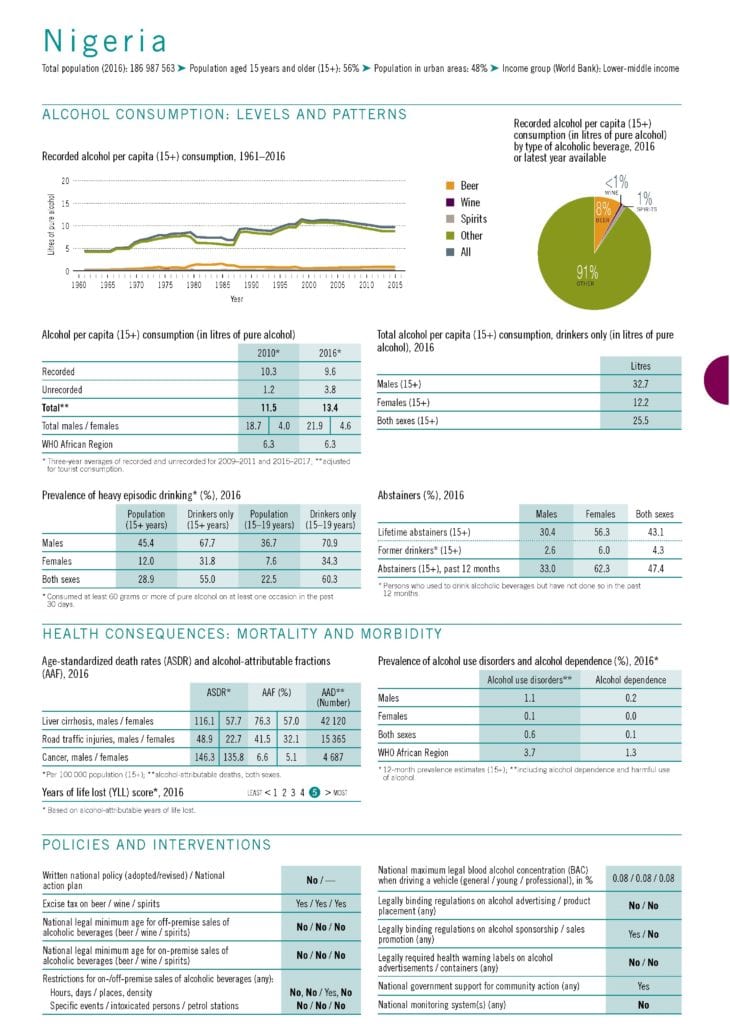Many young people get increasingly exposed to the products and practices of the alcohol industry when they enter college. A variety of reasons come into play, such as:
- The alcohol norm on college campuses and in the adult world,
- Peer pressure, and
- Perceptions of others’ alcohol use.
Young adults in the age of college students are a specific target group of the alcohol industry in Nigeria. Targeted marketing aims to increase consumption in this group, to drive sales and profits for Big Alcohol.
A recent study by Asbaga and colleagues published in the Journal of Substance Use on January 22, 2021 examined the prevalence of alcohol use among Nigerian students. The researchers conducted their study on 1,173 students from six Nigerian federal universities, spread across the six regions of the country. They found the following:
- Alcohol use is highly prevalent among university students;
- About one third (31.4%) of the students reported past 30 days alcohol use;
- 16.8% of students were consuming at low-risk levels; and
- 14.6% of students were consuming at high-risk levels (including heavy alcohol use and alcohol dependence).
There were some differences in the rate of alcohol use based on geography, age and mental health factors.
- Student alcohol use was higher in North East and South South regions and lowest in North West and South West regions of the country.
- Older students aged 19 years reported more alcohol use than those between 16 to 18 years of age, but younger students reported more dependent use.
- Students who reported symptoms of depression, and students who said they perceived their lives as lacking meaning or purpose, reported a higher level of alcohol use.
These differences indicate trends in student alcohol use and ways to address it. The regional differences are occurring due to different alcohol norms and alcohol policy solutions that are in place, or not.
For instance, in the North West region alcohol use is strictly controlled because the community is Muslim, while in the South South region any form of alcohol policy measure is largely absent.
The results also show that alcohol use is a problem across ages. As students age, more start using alcohol and younger students report more dependent use. Mental health appears to play an important role in student alcohol use, which suggests youth maybe using alcohol as a coping mechanism.
Another important trend shown in the results is that there was no significant difference between male and female students’ alcohol use. In the past male students were found to consume more. This means female students’ alcohol use has increased rapidly and caught up to the level of male students now – putting young Nigerian women at ever greater risk to suffer from alcohol harm.
Solutions to protect Nigerian university students’ health
The authors of the study highlight the need to identify and help students with mental health problems in order to reduce risk of them using alcohol. Strengthening healthcare services and targeted interventions to students who face mental health challenges is a suggested solution.
Relevant stakeholders, including government agencies like the National Drug Law Enforcement Agency, need to focus attention on the potential alcohol harm university students might be exposed to. Alcohol is specifically harmful to the developing brain of young adults and can negatively affect brain functioning. Despite this the alcohol industry targets young people to hook them on their products. If the government would make alcohol policy development a national priority, in the face of the heavy alcohol burden Nigerian society is facing, substantial benefit could be reaped in terms of health, development and prosperity in Nigeria.
The World Health Organization reports that almost two thirds (60.3%) of Nigerian young people between the age 15 to 19 years who use alcohol do engage in binge consumption.
The country ranks among the highest in the world for years of life lost due to alcohol – a massive obstacle to sustainable development.
Despite its massive alcohol harm Nigeria does not have a comprehensive national alcohol policy.
The current state of alcohol policy specifically puts youth and children at risk to be exposed to the harmful products and practices of Big Alcohol.
- There is no legal minimum age and barely any regulation of alcohol sales.
- There is no advertising regulations either.
- These gaps in alcohol policy development are aggressively exploited by the alcohol.
The Nigerian government needs to urgently address alcohol policy as a priority to safeguard the youth of the country.
Other African countries, such as Kenya, Botswana or Zambia, have already shown that making alcohol policy development a priority means investing in the protection of children and youth and thus in the country’s future.
